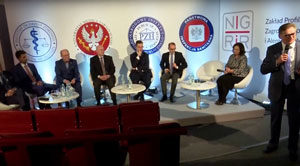On 24th November 2016, at the Medical University of Warsaw took place the III Congress of Public Health. Among the honored guests of the Congress were: the Minister of Health Konstanty Radziwiłł, Secretary of State in the Ministry of Health Jarosław Pinkas, Deputy Secretary of State in the Ministry of Development Paweł Chorąży and the Chairman of the Parliament’s Permanent Commission for Public Health Beata Małecka-Libera. The Congress had been ceremonially opened by His Magnificence Rector of the Medical University of Warsaw Prof. Mirosław Wielgoś.
Prof. Henryk Skarżyński had participated in the panel titled ‘Health challenges in ageing societies. Prophylaxis and prevention of communication disorders’. The Panel had opened Prof. Bolesław Samoliński; its aim was to review the promotion of healthy and active ageing. Other participants of the panel were Dr. Piotr Bednarski, Prof. Józefina Hrynkiewicz, Dr. Władysław Kosiniak-Kamysz, Dr. Filip Raciborski, Prof. Marek Rękas and Michał Szczerba.
Prof. Skarżyński had reminded the participants of the Congress that the ageing society is a challenge for all medical specialties. Communication is of crucial importance in preserving the fitness and independence of the elderly people and it is in a large degree dependent on good hearing. Communication is crucial for obtaining and processing information, creating and supporting relations with other people, being able to act adequately in social and professional situations. Hearing disorders are, besides cognitive impairments, one of the major factors affecting the ability to communicate with the environment and in extreme cases can lead to social exclusion.
– More and more people – especially those entering the senior age – have problems with hearing – said Prof. Skarżyński – It does not only hamper communication but increases also the risk of other disorders. In elderly people with mild hearing loss the risk of depression is two times higher, in people with moderate hearing loss – three times and in patients with severe hearing loss it is five times higher. (…)
At the start of the 20th century the social position of an individual had been determined in 93% by his manual skills, today this position is determined in 94% by his ability to communicate, to receive, select and process huge amounts of information. It is hard to stay active without the efficient senses of sight or hearing.
– Luckily, in the World Hearing Center we can help almost anyone who has hearing loss or other problems with hearing – continued Prof. Skarżyński – Our newest project, carried out with the application of the state of the art technologies, is the Capsule for Sensory Tests. The Capsule is an integrated system of instruments for diagnostics and telerehabilitation of the sensory organs – hearing, sight, balance, taste, and smell. Today such integrated system of devices allowing examining the most important sensory organs all in one place and in a short time, does not exist anywhere in the world. In order to diagnose the disorders of several organs patients must visit different centers, which entails many visits and often long months waiting for a consultation. For many people diagnostics is troublesome enough to give up on treatment. What’s important, the assembly of integrated devices contained in such universal capsule will allow not only diagnostics, but also telerehabilitation of patients with disorders of sensory organs, including hearing implant users – added Prof. Skarżyński.
Prof. Skarżyński had underlined also the important role of the family in the lives of the elderly: – It is possible to improve their quality of life by strengthening the multigenerational contacts, cultivating family values and solidarity. Not by replacing the family with the institutionalized care. There is no system in the world that is capable of providing everyone with everything they need. If we forget about these values we have little chance of reducing their insulation and resulting pain and suffering.
The Congress of Public Health, taking place one year after coming into force of the Act on Public Health was a good occasion for recapitulation and developing recommendations regarding the implementation of the requirements included in this Act and the National Health Program. The honorary patronage of the Congress has held the Minister of Health. It has been organized by the Institute of Health Protection.






